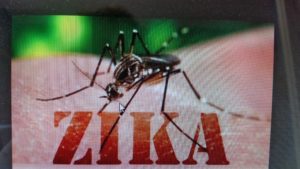By JAN LARSON McLAUGHLIN
BG Independent News
Northwest Ohio’s less than ideal weather may be its saving grace when it comes to the Zika virus.
The shaded areas on a U.S. map showing states with the mosquito species carrying the Zika virus come very close to Wood County. The latest Centers for Disease Control maps don’t show the Zika carriers this far north.
“I don’t think Northwest Ohio has enough heat,” said Connor Rittwage, epidemiologist with the Wood County Health District.
The Zika virus is primarily transmitted by mosquitoes, and has spread through much of the Caribbean, Central America and South America. So far, there have been no reported cases of Zika virus transmitted by mosquito bites in the U.S. However, cases have been reported in travelers returning to the U.S. from Zika affected countries – including nine cases in Ohio.
“There is no risk for Wood County residents just by being in Wood County,” said Wood County Health Commissioner Ben Batey.
That means local residents can go about their normal summer activities without undue worry, Batey said.
“People shouldn’t be concerned about limiting their summer activities,” he said.
However, if traveling to affected areas, local residents should do some research first.
“I’ve gotten questions from people planning their honeymoons,” Batey said. Those couples who may want to have children soon, might want to not visit areas where Zika is common. “I’d look at what country and what the risks are.”

The Centers for Disease Control recently reported that the Zika virus is much more concerning than initially believed. It is the first time a mosquito bite can serious brain injuries to babies, including microcephaly, a birth defect which causes the infant’s head to be small and the brain to not develop properly.
A majority of the adults who get Zika virus will not experience symptoms. “A lot will get it and never know it,” Batey said.
But in some adults, the virus has been linked to Guillain-Barré syndrome, a rare disease that can cause temporary paralysis, sometimes leading to death.
“It can attack the brain,” Rittwage explained.
The virus can be spread from mosquito to human, from mother to baby, but also through sexual intercourse and blood transfusions.
In order to respond to the issue in Wood County, the health district is shifting about $24,000 of its Ebola funding over to mosquito control. That does not mean the health district will be spraying for mosquitoes since that is considered a very ineffective way to reduce the insect population.
Instead, the funding will be used on educational programs to help residents reduce mosquitoes where they live. The district may also trap mosquitoes to make sure the species that carry Zika have not made it to Wood County.
Because this area is naturally swampy, emphasis will be put on how individuals can limit mosquito breeding spots.
“It comes down to not leaving standing water,” Batey said. Education programs will also focus on the proper use of bug spray, recommended clothing, and times to avoid mosquitoes.
“How to protect yourself from getting bit by mosquitoes,” he said.
Doctors and hospitals across the nation will be required to report any cases of Zika virus. “We’ll continue to monitor it,” Batey said.
Some Central America and South America countries are vulnerable not only because of their weather, but also because of their living conditions.
“Puerto Rico is experiencing an outbreak because 50 percent of the population is in poverty,” without screens or air conditioning in their homes, Batey said.
But Batey and Rittwage want area residents to know it is safe to spend time outside.
“We do not feel we will have widespread transmission in Wood County,” Rittwage said.
That is a comfort to Bowling Green officials, who want to give residents helpful information.
“We’ll be echoing the health department message,” by linking the information on the city’s website, said Joe Fawcett, assistant municipal administrator. “We will just try to educate people as much as possible.”
Facts about Zika virus:
Symptoms: Fever, rash, joint pain, red eyes, headache and muscle pain. Symptoms are usually mild and last for several days to a week after being bitten by an infected mosquito. Most people do not know they have been infected.
Transmission: Mosquito bites, from infected mother to child, sexual intercourse with infected male, blood transfusions.
Treatment: No vaccines or medications are available. Treat symptoms with rest, fluids and acetaminophen to reduce fever and pain.
Complications: Microcephaly, poor pregnancy outcomes, Guillain-Barre syndrome.
How to prevent mosquito bites:
- Wear long-sleeved shirts and long pants.
- Stay in places with air conditioning and window and door screens to keep mosquitoes outside.
- Use EPA-registered insect repellents.
- Remove and destroy mosquito breeding grounds such as sagging or plugged roof gutters, old tires holding water, litter, bird baths, inlets to sewers and draining systems holding stagnant water and any other containers or pools of water. Flower pots, standing flower vases, knotholes, and other crevices that can collect water should be filled with sand or fine gravel to prevent mosquitoes from laying eggs in them.
Advice to travelers returning to the U.S.: All travelers (sick or healthy) returning to the U.S. from an area with ongoing Zika transmission should take steps to prevent mosquito bites for three weeks so they do not pass Zika to mosquitoes that could spread the virus to other people.
Sexual intercourse: Men who live in or have traveled to an area with ongoing Zika transmission should consider using a condom.
Anyone with questions about the Zika virus are advised to call the health district at 419-352-8402, call their personal physicians, and follow CDC recommendations for travel. Information may also be found at http://www.woodcountyhealth.org/nursing/zika.html.

